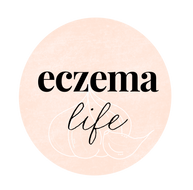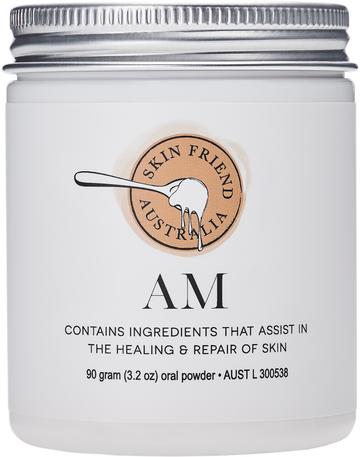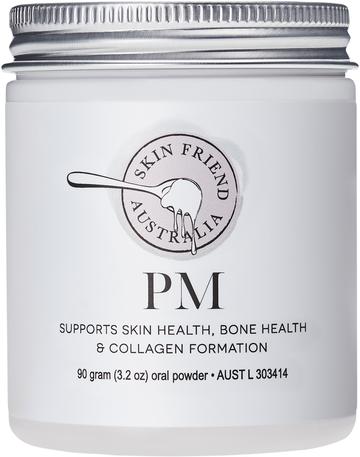What is red skin syndrome?
Red Skin Syndrome is another name for topical steroid withdrawal (also referred to as TSW). In the 1970s it was referred to as 'topical steroid addiction'.
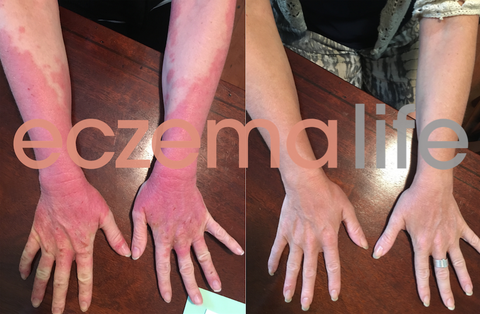
According to American researchers who evaluated over 1500 patients, "the worsening problem is due to corticosteroids (topical steroids), not uncontrollable eczema. The basis for the skin redness seen in these patients is an elevation in blood nitric oxide levels.”
What does elevated nitric oxide do (in the blood)?
It widens your blood vessels, increasing blood flow to the skin which causes the skin to appear red. This, teamed with a rash such as eczema, is red skin syndrome.
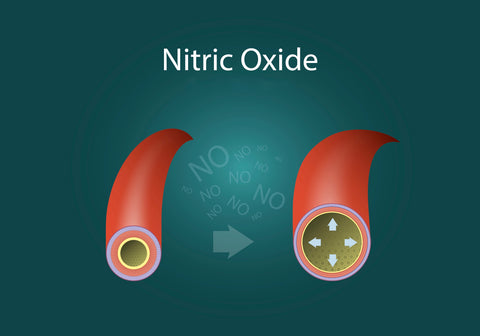
diagram: how elevated nitric oxide affects your blood vessels and leads to red skin flushing.
Red skin syndrome signs and symptoms
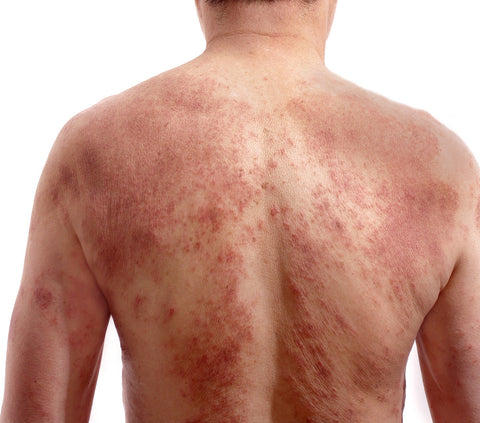
While all symptoms may not be present in one person, here are the twelve most common signs of red skin syndrome (topical steroid withdrawal):
Worsening of your rash and increases redness as you skin is no longer responding to topical steroids and other drug treatments.
- Worsening of your rash and increases redness as you skin is no longer responding to topical steroids and other drug treatments.
- Severe burning sensations of the skin. The redness and burning sensation are due to continuous vasodilation, which often is accompanied by intercellular and extracellular fluid retention (ref).
- Skin is red, dry and it crinkles easily. You may also see underlying blood vessels.
- Skin depigmentation or dark pigmentation - seen as either white patches on the skin or dark brown/grey areas of the skin, commonly seen near the knees, elbows and on the face, but can occur anywhere topical steroids are used.
- Stretch marks on the skin (aka. atrophic striae) - these can look like stripes across the skin and they are a sign your skin is low in zinc and other minerals.
- Skin swelling - your skin can look puffy and swollen, and it can be tender to touch.
- Pimple-like bumps (papules), nodules and pustules - bumps appear and look like acne. Also known as 'steroid acne' or 'pustular psoriasis'.
- Extensive wrinkling of skin (premature skin ageing) - some patients call this 'elephant skin', especially seen above the knees, arms and hands but it can occur anywhere on the body.
- Loss/thinning of hair and/or loss of eyebrows - your hair may fall out in clumps.
- Cracked skin - especially on the corners of the mouth, lips and hands.
- Frequent skin infections - requiring antibiotic treatment.
- Increased itch - the itch is getting worse and there seems to be no relief in sight.
Symptoms reverse and improve over time, especially with nutritional support which speeds up the recovery process.
Red skin syndrome: causes
According to the National Eczema Association report:“Topical Steroid Withdrawal (TSW, sometimes called “topical steroid addiction” or “Red Skin Syndrome”) can occur when topical corticosteroids (TCS) are inappropriately used or overused, then stopped. It can result from prolonged, frequent, and inappropriate use of moderate to high potency topical steroids. It is thought that adult women who blush easily are a population particularly at risk. Very few cases have been reported in children, but no large-scale studies have attempted to quantify the incidence.”
Burning, stinging, and bright red skin are the typical features of topical steroid overuse and withdrawal. The signs and symptoms occur within days to weeks after discontinuing use of topical steroids.
How to prevent topical Red Skin Syndrome?
1. Don't go cold turkey when coming off topical steroids
This means slowly cutting down on your applications, rather than stopping suddenly. For example, use a lower strength steroid, then only use it every second day for a week, then every third day for two weeks, and so on until you are applying them once a week. After about a 6 weeks of slowly cutting down on topical steroids, stop using them.
2. Feed your skin with nutrients
It's important to give your body what it needs during this time of hormonal imbalance and healing. Red skin syndrome can take a couple of years, or more, if you do not have extra nutritional support.
Nutritional support reduces the risk of loss of hair, eyebrow loss and "elephant skin" and it helps patients with red skin syndrome recover faster.
People with red skin syndrome can become sensitive to a range of chemicals including salicylates, preservatives, food additives, amines and MSG. So they should eat a diet low in chemicals such as The Eczema Detox
Top 10 nutrients for Red Skin Syndrome
As people with red skin syndrome have elevated nitric oxide levels in the blood, a gentle detoxification program to help reduce the levels of toxins in the body is advised. Using nutrients supplied from your diet and supplements, the body also repairs and creates new skin cells deep within the skin. It takes about 28 days for new, healthier skin cells to travel to the surface and appear as new skin.

I usually prescribe the Skin Friend supplements for red skin syndrome as it contains magnesium, vitamin B6 (and other B vitamins), molybdenum, zinc and other nutrients required by your liver to detoxify nitric oxide and steroid hormones.
If your liver is low in these nutrients, the deactivation process does not occur so the nitric oxide and other chemicals are released back into your bloodstream. If your liver dose not have access to these nutrients, red skin syndrome can 1-2 years to subside.
People with red skin syndrome commonly have cracks at the corner of the mouth, mouth ulcers, hair loss and scaly skin, and these are signs your body is deficient nutrients for skin repair. For these symptoms I usually prescribe Skin Friend AM.
For people who also have poor sleep or insomnia, anxiety and eczema I also prescribe Skin Friend PM.
If you are looking for a diet to speed up recovery from red skin syndrome syndrome, The Eczema Detox is designed to speed up the detoxification process, restore gut health, balance the immune system and strengthen the health of your body.
To read more posts and articles on Topical Steroid withdrawal click Here
Products
At Eczema Life, we recommend nutritionist Karen Fischer's low food chemical program (The Eczema Detox) along with additive-free supplements for skin health and wellbeing. Click on the images to view more details:
